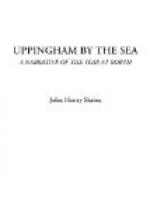“To the Rev. Edward Thring, M.A., Headmaster, and to the Assistant Masters of Uppingham School.
“Gentlemen,—We, the undersigned residents in Uppingham, have great pleasure in meeting you with a hearty welcome on the re-assembling of the school in full numbers in its native home, and gladly avail ourselves of this opportunity of conveying to you our congratulations that the period of anxiety and trial through which you have so successfully passed has clearly demonstrated the sound principles upon which the school has been conducted, and which have raised it to its present eminence as one of the great schools of the country, and have won for it the confidence of parents in all parts of the kingdom, many of whom have entrusted their sons to your care at Borth, and are continuing that trust now that you are returning to your homes.
“We desire also to express our sense of the courage and enterprise manifested in removing the school from Uppingham at the time of the anxious crisis in February, 1876.
“And we pray Almighty God that it may please Him to bless the school, and that under His guidance those who from time to time leave the school may as scholars and Christian gentlemen uphold its fame in whatever sphere they may be placed.
“Uppingham, May, 1877.”
The HEADMASTER then rose and said: “Mr. Bell, Mr. Hawthorn, and friends in Uppingham,—Home is home, and you may be quite sure that we, at all events, who went through exile felt it indeed to be home when we came back again. (Applause.) It does not signify what the circumstances may be, but it is not possible to live long in a place and to have your home there without taking root in it, and having fibres sent deep which cannot be torn up without pain. (Applause.) We are very grateful, therefore, for the hearty, the enthusiastic welcome you gave us on our return. (Cheers.) Assuredly as our eyes looked on this pleasant hill and the familiar fields, we felt a deep thankfulness for the great peril passed, the page of life turned, and a year such as never can come again closed with success. (Applause.) And it is a pleasant spot to look on when you come down the dip of the valley before you near Uppingham, and look up and see the ancient homes crowning the brow of the hill—it is a fair sight to any eye, even to a stranger’s eye, the pleasant homes of Uppingham, with the church and its spire in the midst, the spire of the school chapel beyond, each adding, methinks, to the beauty of the other, and both alike in their upward spring and their holy worship. It is a pleasant spot to look on, and you made your old picturesque street very beautiful with your decorations and that bright outbreak of welcome which greeted us as we came in. (Cheers.) The school hardly knew what we meant—they did not know when we asked them to cheer at the top of the hill; but as the stream of life wound round and came in sight of that avenue of arches and flags, then




